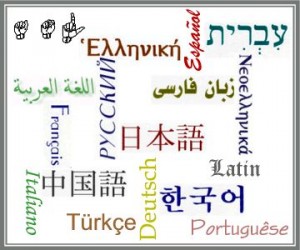 In keeping with our theme from last week (population guesses for unreached peoples), we received a note this past week from a worker in the Middle East who wrote, “The majority of the Unengaged Unreached People Groups still on the list don’t prefer the language they are listed as speaking as the language in which they want to study the Bible. Governments and globalization have successfully shifted the younger generation to prefer the trade language as the preferred language of learning. Americans who trained years ago, who do not stay up with the younger generations on the field keep saying, “Heart language is the key.” I now call those “heart languages” more like “Home languages.” The minority groups might eat breakfast in a tribal language but they long to spend the rest of their day speaking the national trade language.” This would have radical implications for Bible translation. Do you agree or disagree? Just click “Comment” below to express your opinion please.
In keeping with our theme from last week (population guesses for unreached peoples), we received a note this past week from a worker in the Middle East who wrote, “The majority of the Unengaged Unreached People Groups still on the list don’t prefer the language they are listed as speaking as the language in which they want to study the Bible. Governments and globalization have successfully shifted the younger generation to prefer the trade language as the preferred language of learning. Americans who trained years ago, who do not stay up with the younger generations on the field keep saying, “Heart language is the key.” I now call those “heart languages” more like “Home languages.” The minority groups might eat breakfast in a tribal language but they long to spend the rest of their day speaking the national trade language.” This would have radical implications for Bible translation. Do you agree or disagree? Just click “Comment” below to express your opinion please.












Dear all,
I am living in Central Asia for more than ten years and I made a lot of interesting experiences.
We have rather small minorities with less than one percent like the local Koreans. The generation up to 50 does not know any Korean at all in general, they know very well Russian, the trade language. For them a Korean Bible translation would be useless. On the other side we have Kyrgyz, who are very proud and about 75 % prefer to speak in Kyrgyz if it is a heart matter, however if you go to a car repair place they will speak with you in Russian. The importance of Kyrgyz is growing year after year. Than we have an Uzbek minority with 16 %, which went through serious riots last year. They all know Russian and Kyrgyz too, but their heart and home language is for sure Uzbek. I know of other small minorities like the Dungans, who speak all perfectly Russian, but they value, if you can speak with them in Dungan. A national trade language might be known and perfectly understood, but minorities might not like the use of this language, because of historical and political reasons, because of persecution or nationalism of a majority.
So, I want to make the point that there are still a lot of cases for a heart language for many or even most of the minorities.
Yours Storybek
Your reader raises a great point, but the issue is much more complicated than asking what language a group prefers. There are many examples of people who cannot understand the translation that they prefer, e.g., the KJV.
The Bali people in central Africa use the trade language, Swahili, for most activities outside the home. But while teaching on Ex 20:5, “I, the Lord your God, am a jealous God,” they became confused over the meaning of the Swahili word for jealousy. When I explained its meaning by noting several examples of jealously that we had seen in the village, and their eyes brightened with understanding. “Now that verse about a jealous God makes sense!”
I then told them that Ron Butler was working on a revision of the Congo Swahili Bible, and he would want to know what word or phrase they typically used when they talked about jealousy in Swahili. After discussing the matter among themselves for a while, they concluded, “We never talk about jealousy in Swahili. That is something that we only talk about at home, and we only talk about in Bali.”
So no matter how fluent they were in Swahili, they still needed a Bali translation if they were to understand the many issues of the heart to which the Bible speaks.
Much of Indonesia is like the writer describes. I have completed a New Testament translation into one tribal dialect in that country, and currently our team is finishing the New Testament in Plain Indonesian. (The translation is called the TSI. See bahasakita.net.) While I am currently focused on this new national-language translation, I still feel that each group’s ethnic language is very important and could be key for members of the group to reach full maturity in Christ. One thing I would add to the writers comments is this illustration: The Orya New Testament has greatly blessed the 2,000 Orya people in the six years since it was published. But what do I see when I visit Orya churches? On Sunday morning, there are nearly always people in the congregation who are not Orya speakers. Often these are government school teachers or other officials. So, in deference to those people the pastors revert to using the default Indonesian Bible, which uses such difficult language that everyone has trouble understanding it. That’s why we are producing a Plain Language translation that we hope everyone will understand. The Orya pastors are right. When the body of Christ meets, it should be a time of unity in which members of different ethnic groups will feel welcome. Indonesia is a country that still has 500 language groups waiting for God’s Word in their “home” language. While they are waiting (and it will be such a long wait), it is important for them to be able to understand God’s Word in their second language. So while it is important to reach Unreached Peoples in their mother tongue, I feel that a very needy hidden and unreached group is all those who would like to read God’s Word in the plainest form of the national language. There are quite a number of other countries like Indonesia, where their main Bible uses high and abstract language that is hard for various pockets of people to understand.
I agree that this question is far more complex than the language people prefer. Someone can prefer a language of prestige or economic reasons, but that language does not communicate like the heart language. The controversy surrounding the translation of the Bible into Patois in Jamaica shows different sides of this discussion.
But let’s look at the translation of the Bible into European languages. The first translations were never the result of the majority of people saying that they wanted the Bible in their own languages. (Although once they got it then they often did.) Instead, intellectuals and religious leaders like John Wycliffe, John Hus and Martin Luther lead movements that resulted not just in translations, but in the idea becoming prevalent that “I need/want to read the Bible in my heart language.” It seems to me that through the ages the church and missionaries have provided leadership, including theological and intellectual arguments, not just for translation, but also for the inherent value of the language, even where the speakers themselves did not have such a vision. That includes English and German, among others. So the question is not just if local people want the Scriptures in their languages. It is what are church leaders, theologians and others willing and eager to promote, and are they capable of swaying popular opinion.
Regarding the “Heart language vs. trade language” issue,
I recently watched the MAGDALENA – “Through her eyes” DVD with M., a young man from Senegal. I find that he understands French perfectly. After eating dinner with him that evening, Christmas Eve that is, I drove him home. He wanted me to meet his brothers (or maybe his brothers wanted to know who had had dinner with)… anyway, I went to their flat in another area of the city of Rome and found out that they were watching satellite TV from their own nation of Senegal. Though their language is supposedly Wolof, their national TV, sports news and football reports was all in French. So, indeed, amongst educated people the “trade language” is often used a lot to communicate important things.
Andrew from Rome, ITALY